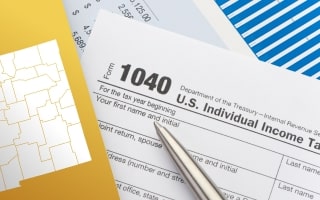Property Tax Records in New Mexico

If you're considering buying a home in New Mexico, the state has some of the lowest property taxes in the country. While the national average tax rate is 0.99%, the average in New Mexico is just 0.73%. Keep in mind that tax rates can differ based on the county you live in.
There are two counties with tax rates that exceed 1%, which include Bernalillo and McKinley. At 2.79%, McKinley County easily has the highest tax rate in the state. However, these taxes are offset by low property values.
One reason property taxes are well below the national average is that they have been capped by state law. The taxable value of a home can only increase by 3% every year. Even if home values skyrocket in a given year, assessment values won't change much.
While due dates may vary from county to county, property owners are typically tasked with paying property taxes twice per year. The initial payment must be paid by November 10, while the second payment is due April 10.
Property taxes are determined by the home's assessed value and the county's tax rate. County assessors value properties in January each year, and tax rates can change based on the county's annual budget.
While New Mexico has charged property taxes for much of its history as a state, a large portion of the existing tax law was adopted in 1973. The New Mexico Legislature passed a Property Tax Code that ensured the state was the primary enforcer of property tax obligations.
Property Tax Assessment in New Mexico

Your property taxes are based primarily on your home's market value. This value is calculated every year by your county assessor. Your 2024 property tax bill will be based on the 2023 value of your home. However, your county's tax rate won't be calculated with the market value. First, your home's taxable value must be identified. In New Mexico, the taxable value of real estate is one-third of the total appraised value. The reality is that New Mexico property tax assessments aren't complicated and are easy to understand.
If your home has a market value of $225,000, its taxable value will be around $75,000 minus any exemptions you qualify for. As touched upon previously, the value of your property can only increase by 3% every year. For example, a home that's valued at $225,000 one year can only increase to $231,750 the next year. However, this cap can be lifted if you make improvements to your home.
In New Mexico, property tax rates are displayed as mills. One mill is the same as $1 in tax for every $1,000 of your home's taxable value. If you live in a county that charges a mill rate of 25 mills, your annual property taxes will be $1,875.
You can also use your county's effective tax rate to determine how much you'll owe for the year. If you live in San Juan County, the tax rate is $0.87%. Make sure you multiply the effective tax rate by your home's market value instead of its taxable value. In this scenario, your annual property taxes will amount to $1,958. The average tax rates for the most populous New Mexico counties are:
- Bernalillo County: 1.18%
- Doña Ana County: 0.76%
- Santa Fe County: 0.64%
- Sandoval County: 0.59%
- San Juan County: 0.87%
As you can see, property taxes in New Mexico are low, even property taxes in Bernalillo County are low. If you want to save even more money, Sante Fe County property taxes are even lower.
Calculate New Mexico Taxes
Using a New Mexico property tax calculator is a smart way to gain a clearer understanding of how property taxes are determined across the state. This tool allows both homeowners and real estate investors to input key property details, such as location, market value, and property classification, to estimate their annual tax assessment and liability. In New Mexico, residential property is assessed at one-third of its market value, and property tax rates are determined by local counties, municipalities, and school districts.
A New Mexico property tax calculator also helps identify potential exemptions and tax relief programs that can lower your tax burden. Homeowners may qualify for the Head of Household Exemption or the $2,000 Veteran Exemption, which reduces the taxable value of a primary residence. Additional programs are available for low-income seniors and disabled individuals, including the Value Freeze Program, which freezes the assessed value of a home for qualifying residents age 65 or older.
using our property tax calculator.
New Mexico Property Tax Records: What Are They?

When you pay property taxes in New Mexico, your money will be used to support the county government and the services it provides. Around 50% of tax revenues go to city and county governments. Another 30% pays for school systems. Community colleges and hospitals also receive some of these funds.
If you're thinking of buying a home or rental property in New Mexico, you can learn more about it by checking up-to-date tax records. New Mexico provides the public with tax records that can be accessed for free through online databases. Every county has its own database that you can use to get this information.
In Bernalillo County, you can search for a property with its parcel ID or address. Once you bring up the tax report, you can view everything from the latest property taxes to the current assessment value. In this reports you can find property owner name and also following information:
-
Parcel ID
-
Tax district
-
Class
-
Tax year
-
Legal description
-
Document number
-
Total square footage
-
Year built
-
Lot size
-
Land use code
-
Architectural style
-
Notice of taxable value
-
Map
-
Satellite view
-
Tax calculator
Property Tax Exemptions and Deductions in New Mexico

While property taxes in New Mexico are lower than what you'd pay in most other states, you may still be able to qualify for an exemption or deduction that reduces your taxes. There are four types of tax breaks that New Mexico property owners can apply for. Here is a look at the New Mexico property tax exemptions that you may be able to take advantage of:
Head of Family Exemption: If you own a home and are the head of a family, you might be eligible for this exemption. Homeowners who qualify for this exemption will be able to reduce the taxable value of their properties by up to $2,000. You must be a New Mexico resident to claim this exemption. You only need to apply for this exemption once. In subsequent years, it will automatically be applied to your property tax bill before it's mailed to you.
Veteran Exemption: If you're a resident of New Mexico and a veteran, you might qualify for this exemption. Keep in mind that you'll need to submit your application directly to the New Mexico Department of Veterans' Services if you believe you qualify. They'll determine if you're eligible based on the criteria of this exemption.
If you qualify, you'll receive a Certificate of Eligibility that must be sent to the county assessor to claim the exemption. This exemption will reduce your home's taxable value by as much as $4,000 per year.
Disabled Veteran Exemption: Disabled veterans are exempt from paying property taxes. If you wish to apply for this exemption, the home you own must be your primary place of residence. While this exemption eliminates your property taxes, there are a couple of restrictions that you'll need to abide by. For example, the exemption can only be obtained for properties that are less than five acres in size. Any extra acreage on your property will be taxable.
Low-Income Valuation Freeze: This tax break isn't the same as the other exemptions. It effectively freezes the valuation of your property. When the freeze is in effect, your property taxes won't increase. While this tax break is for the current tax year, it's based on your income tax returns from the previous year.
Once you receive the Notice of Valuation that lists your home's current assessed value, you'll have 30 days to apply for an assessment freeze. Your Notice of Valuation should be mailed to you by May 1. Keep in mind that this doesn't freeze your taxes. You'll still receive an annual bill that you'll need to pay by the due date.
Unlike the exemptions that are mentioned in this guide, the valuation freeze doesn't automatically become permanent after you apply for the first time. You must apply for three consecutive years to gain a permanent freeze. To qualify for this tax freeze, you need to be at least 65 years old or disabled. You must also be a resident of New Mexico. The modified gross income in your household needs to be less than $37,300. The documents you must submit with your application include the following:
- Copy of your photo ID
- Address, account number, and legal description of your property
- Verification of income for yourself and all other residents
- Proof of occupancy
- Documentation from the Workers' Compensation Administration or Social Security Administration that displays your disabled status
How To Search Property Tax Records in New Mexico

If you want to obtain tax records for a specific property, you can either use your county's online database or a third-party tool like PropertyChecker. There isn't a major difference between the two. However, PropertyChecker often includes more information. The tool may also be easier to use. Some counties haven't updated their databases for years, which can make them more challenging to navigate.
If you search for these records through your county's database, you may be able to pay your property taxes from the same website. When using PropertyChecker, you can search for New Mexico properties with parameters like property address, owner's phone number, and parcel ID. Once you submit the necessary information, you'll receive the following property details and records:
-
Neighborhood information
-
Property Values, including assessed and market values
-
Details about the home, such as the square footage
-
Owner names
-
Loan records
-
Deeds
-
Purchase history
-
Foreclosures
-
Building permits
-
Lien records
How To Appeal Property Taxes in New Mexico

If you believe that the taxable value of your property is too high or that the county assessor has made a significant error, you can appeal your property taxes. All properties are valued in January. You should receive a Notice of Valuation by May 1, which allows you to view your home's current market value as well as its taxable value. If you decide to appeal, the following guide can help you navigate New Mexico property tax appeals.
Step 1: You can choose to appeal the taxable value of your home or a denial of a tax exemption claim. Start this process by appealing to the Administrative Hearings Office. After you receive the Notice of Valuation, you'll have 30 days to file an appeal.
Step 2: While the first hearing is informal, you'll have the opportunity to present your evidence, which could involve a third-party appraisal. Your county assessor may be able to resolve the issue without a formal hearing.
Step 3: If you disagree with the county assessor's decision, you can request a formal hearing with your county's Valuation Protest Board. The Board will receive the same evidence that you showed during the informal hearing.
step 4: An additional round of appeals is possible if you also disagree with the decision that the Valuation Protest Board comes to. From here, you can appeal the ruling to the District Court.
How Property Tax Records Impact Real Estate Transactions in New Mexico

Since the average tax rate in New Mexico is below 1%, property taxes shouldn't be a significant factor in real estate transactions. However, these taxes can add $100 or more to a buyer's monthly mortgage payment, which is why sellers often need to consider how they price their homes. Some buyers automatically avoid making offers on properties that are situated in a county with a high tax rate.
While Bernalillo is the most populous county in New Mexico, it also has the second-highest tax rate, which might come into play when selling a home. If you're an investor who's looking to buy a rental property, calculate property taxes before you make an offer. You can use property records to determine how much tax the owner has paid in recent years. Keep in mind that high property taxes can reduce your cash flow.
In New Mexico, homeowners who don't pay their taxes on time may risk their properties being sold in tax sales. As mentioned previously, property taxes must be paid by November 10 and April 10. If these payments are late by a month, they will become delinquent.
While some states sell tax liens to investors, the counties in New Mexico sell delinquent properties instead. If your taxes become delinquent, a lien will be placed on your home, which the county will hold onto for two years. If you don't repay your outstanding taxes during this period, your property can be sold at a public auction. Investors often use these tax sales to purchase properties at a discount.
Free New Mexico Property Tax Lookup
Tax Records Please wait...
Property Tax Guide
- Property Tax Records in New Mexico
- Property Tax Assessment in New Mexico
- New Mexico Property Tax Records: What Are They?
- Property Tax Exemptions and Deductions in New Mexico
- How To Search Property Tax Records in New Mexico
- How To Appeal Property Taxes in New Mexico
- How Property Tax Records Impact Real Estate Transactions in New Mexico
Instant Access to New Mexico Property Records
- Owner(s)
- Deed Records
- Loans & Liens
- Values
- Taxes
- Building Permits
- Purchase History
- Property Details
- And More!
Free New Mexico Property Tax Lookup
Tax Records Please wait...
Property Tax Guide
- Property Tax Records in New Mexico
- Property Tax Assessment in New Mexico
- New Mexico Property Tax Records: What Are They?
- Property Tax Exemptions and Deductions in New Mexico
- How To Search Property Tax Records in New Mexico
- How To Appeal Property Taxes in New Mexico
- How Property Tax Records Impact Real Estate Transactions in New Mexico